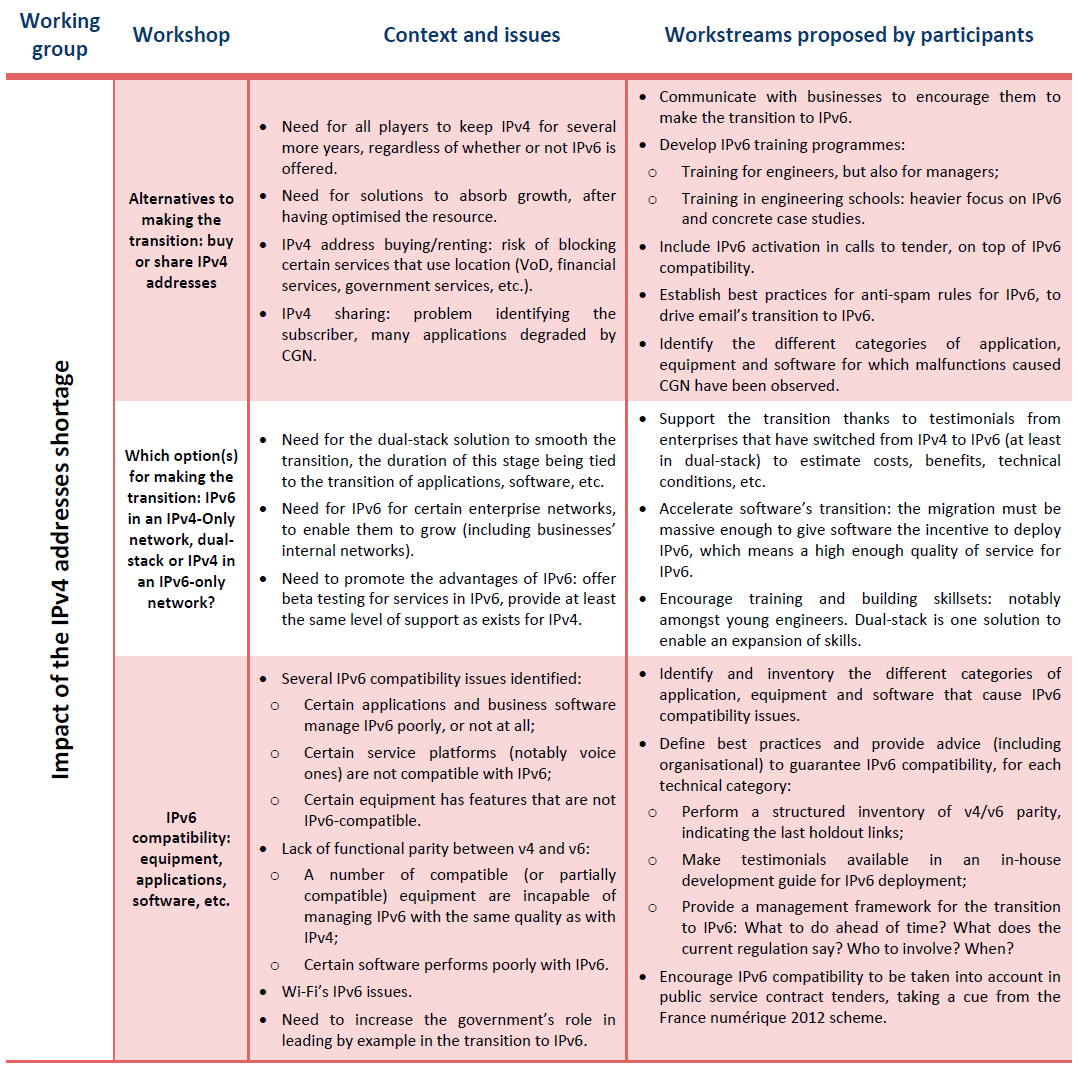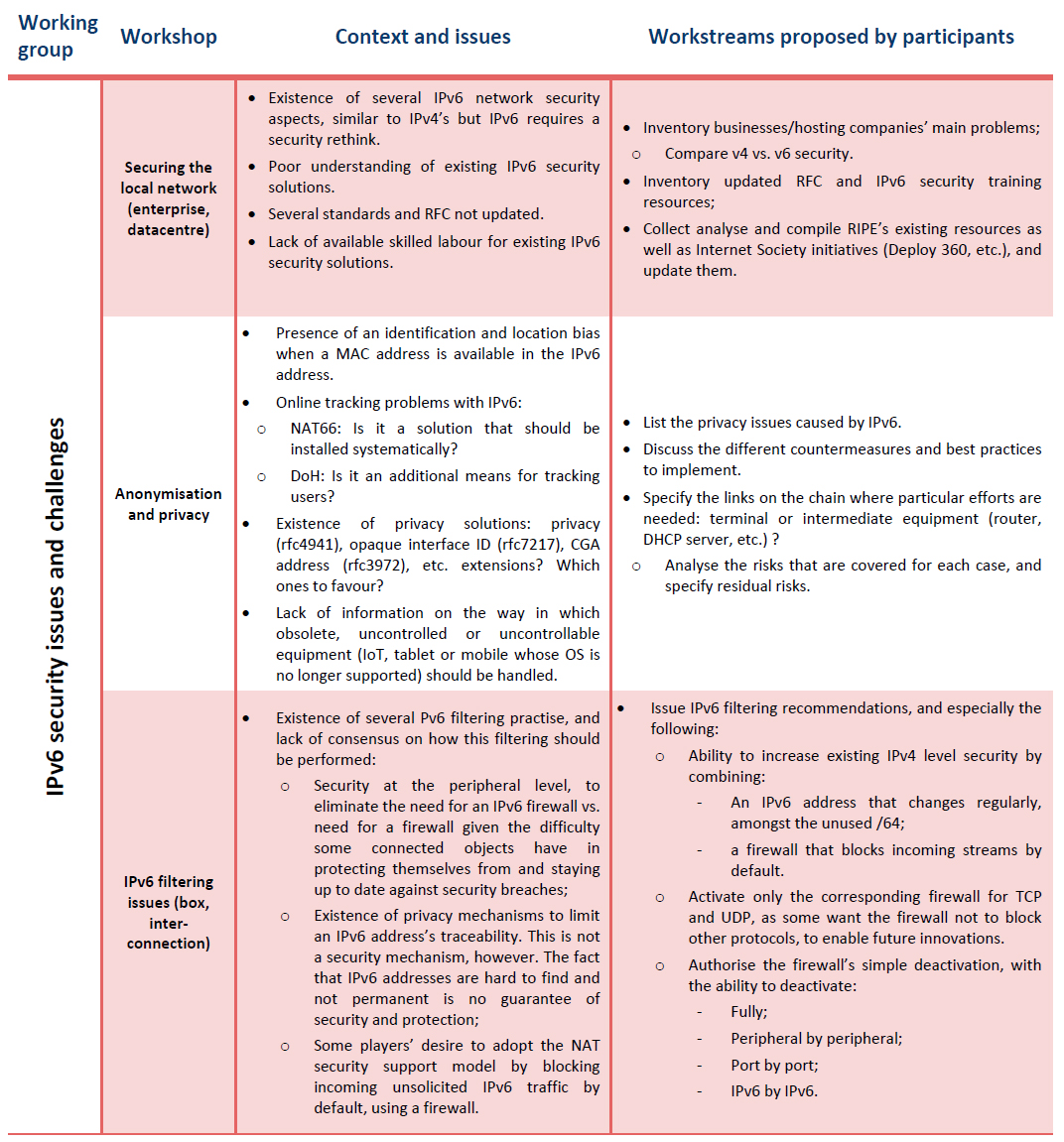Following through on the workshops devoted to the transition to the IP♥6 protocol, Arcep created a task force, in concert with Internet Society France, to accelerate the transition to IPv6 by galvanising the forces of all of the willing internet stakeholders (operators, hosting companies, businesses, public sector players, etc.).
At a time when the announced shortage of IPv4 addresses is now a reality, Arcep played host to some 50 stakeholders at its headquarters, on 15 November 2019, to launch the task force and organise multi-stakeholder working groups:
- The first working group focused on the impacts of the IPv4 address shortage. The workshops explored alternatives to not making the transition to IPv6, technical solutions for making the transition and issues surrounding equipment, software and applications’ compatibility with IPv6. The working group was preceded by a keynote from RIPE-NCC (the regional registry for IP addresses which is tasked with allocating IPv4 addresses in Europe and the Middle East) which provided a regional view of the current shortage of IPv4 addresses, and served to underscore how urgent it is to accelerate the transition to IPv6.
- The second working group addressed IPv6 security issues. Discussions tackled the topics of securing the local network, anonymisation and privacy issues as well as filtering challenges. A keynote from France’s National Cybersecurity Agency, ANSSI, introduced this working group by focusing on the need to rethink security with IPv6.
The account of the work done by these groups is being published today. Between now and the next meeting of the IPv6 task force, which is scheduled for spring 2020, participants will continue to collaborate on deepening some of the identified work streams.
Account of the launch meeting of the Task Force on IPv6 in France
The different workshops helped to identify concrete proposals for actions to accelerate the transition.
The table in the annex details the different points that emerged from each working group.
1. Working group: impact of the IPv4 addresses shortage
a. Context and issues
- Need to keep IPv4 for as long as the transition to IPv6 has not been finalised on every link of the internet’s technical chain;
- Problems created by alternatives to making the transition (buying or sharing IPv4 addresses);
- Existence of various options for making the transition: IPv6 in an IPv4-only network, dual-stack [1] or IPv4 in an IPv6-only network;
- Certain equipment, applications, software, services, etc. IPv6-compatibility issues;
- Management differences between IPv4 and IPv6, notably in the features deployed and in terms of performance;
- Need to increase the government’s role in leading by example in the transition to IPv6.
b. Workstreams
- Communicate with businesses to encourage them to make the transition to IPv6;
- Include IPv6 activation in calls to tender, on top of IPv6 compatibility;
- Obtain testimonials from enterprises that have switched from IPv4 to IPv6 (at least in dual-stack) to estimate costs, benefits, technical conditions, etc.;
- In addition to these testimonials, draft an in-house development guide for IPv6 deployment;
- Identify the different categories of application, equipment and software for which malfunctions caused by Carrier Grade NAT (CGN) [2] have been observed;
- Inventory the different categories of application, equipment and software that cause IPv6 compatibility issues.
2. Working group: IPv6 security issues and challenges
a. Context and issues
- Existence of several IPv6 network security aspects, similar to IPv4’s but IPv6 requires a security rethink;
- Lack of available skilled labour and poor understanding of existing IPv6 security solutions;
- Several standards and RFC not updated,
- Taking anonymisation and privacy protection issues properly into account when implementing IPv6:
- Lack of knowledge of IPv6 filtering best practices.
b. Workstreams
- Inventory updated RFC and IPv6 security training resources;
- Compile the RIPE’s existing resources as well as Internet Society initiatives, and update them;
- List the privacy issues caused by IPv6 and discuss the different countermeasures;
- Issue recommendations on how IPv6 filtering must be performed.
N.B. This account in no way constitutes Arcep’s position on the relevance, feasibility or priority of the workstreams. Its only purpose is to describe the information that the different participants provided to the IPv6 Task Force. The courses of action to take will be prioritised in concert with the participants community.
[1] Double pile IP: consists of assigning a piece of network equipment both an IPv4 and a an IPv6 address.
[2] Carrier Grade NAT: large-scale Network Address Translation mechanism, used in particular by ISPs to reduce the number of IPv4 addresses used.
Associated documents
Videos of the IPv6 Task Force launch meeting
• Workshop opening address by Loïc Duflot, Director of Arcep’s Internet, Print media, Post and Users department, and by Nicolas Chagny, President of Internet Society France
• Presentation of the barometer of the transition to IPv6 in France by Aurore Tual, Open Internet Unit Chief, and Arcep policy officers, Samih Souissi and Vivien Gueant
• Keynote by Xavier Le Bris, RIPE-NCC
• Talk by Arcep Chair, Sébastien Soriano
• Keynote by Arnaud Ebalard, ANSSI


